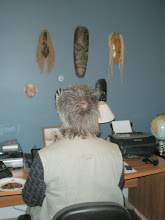"An A.A. group ought never endorse, finance, or lend the A.A. name to any related facility or outside enterprise, lest problems of money, property, and prestige divert us from our primary purpose."
For those of us who have already forgotten what we learned in Tradition Five – the Tradition immediately preceding Six – we might ask: what exactly is the "primary purpose" of Alcoholics Anonymous? “Oh, yeah,” we recall. “To carry the message to the alcoholic who still suffers.” Sometimes I wonder if we reinterpret our primary purpose to read “to save every single suffering alcoholic in the world, whether they want to be saved or not.” This is why we have Tradition Six: to make sure we don’t get carried away with our missionary work.
We, who were once lost, have found a way out and we're anxious to tell you about it. We know what we're talking about and we're going to convince you that if you just do what we say, then you will get to live a life of unbelievable joy and absolutely no pain, skipping and dancing in the park, chasing butterflies on a beautiful day without a care in the world. There will be a lot of adorable children there and a delightful breeze. We will bring all of the resources at our disposal to this task.
Well, maybe I'm exaggerating a little bit but don't most of us tend to think that A.A. is a pretty good solution to the alcohol problem? And what do we alcoholics do when we think we have a good idea? We go hog wild. We throw ourselves into the task with tremendous energy and optimism. We start to imagine that we have the answers to a lot of other problems as well. Maybe our techniques for dealing with a wet drunk will translate into effective solutions for all kinds of other social and moral issues.
While our enthusiasm is admirable, we have learned through hard experience that we need to focus our efforts on spreading the message to what we know how to do best: getting sober using our Twelve Step program. What do we suggest? Call your sponsor; go to meetings; read the Big Book; work the Steps. This kind of advice doesn't require a PhD in psychology. There isn't much to interpret there. We don’t need a lot of expert advice to carry out these instructions. I got a handle on these as soon as I rolled into A.A. enveloped in a cloud of pot smoke and beer foam.
In our Program’s early days our founders tried all kinds of wonderful experiments that blew up in their faces. We love to tinker with dynamite and a pack of matches. We tried the hospital technique, where we set up institutions under the A.A. name and tried to lure in alcoholics so we could wash them up, run them through the wringer, then hang them out to dry. This didn’t work out very well.
Then we toyed with education hoping, no doubt, to talk some sense into the drunk. After all, we were masters of logic when we were drinking. We could put forth such a convincing explanation as to how our car got off the road and into a pond all by itself that we ended up believing the story ourselves. Even more shockingly, we went so far as to dip our toe into law enforcement and the court system. “Don’t lock that poor drunk up; just sign him over to us and we’ll take care of everything.” And we were going to charge for our services and plow all the profits back into these various and sundry causes.
Bill W remembers: “Why, we thought, our Society of Alcoholics Anonymous might prove to be the spearhead of a new spiritual advance! We might transform the world.” I guess if we were going to be delusional about our own abilities we figured we might as well swing for the fences. A lot of these programs got started when the old timers had just a few years of sobriety themselves and couldn’t see the pitfalls in the glare of their own enthusiasm.
“Concerning endorsements – we saw as never before that we could not lend the A.A. name to any cause other than our own.”
Thursday, May 14, 2009
Subscribe to:
Post Comments (Atom)

No comments:
Post a Comment